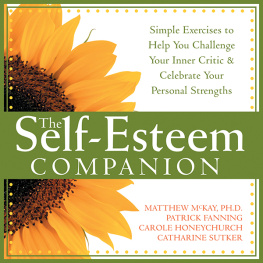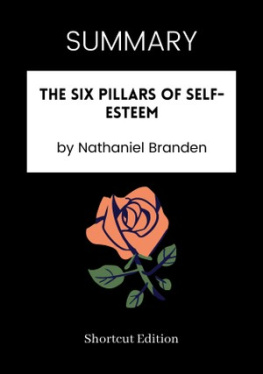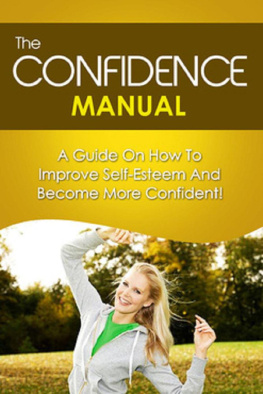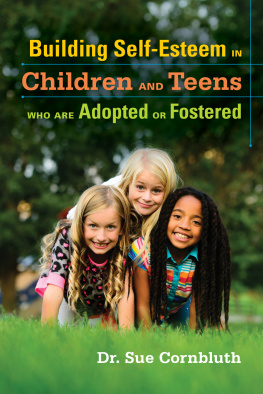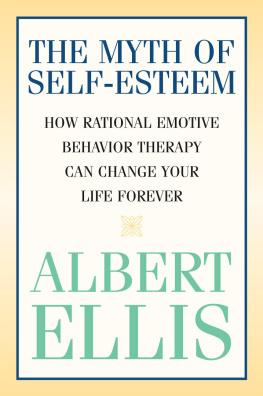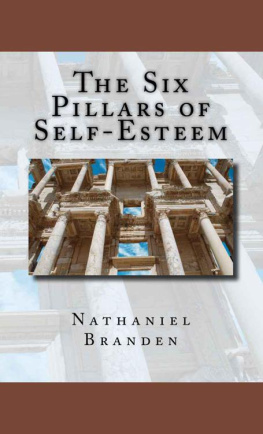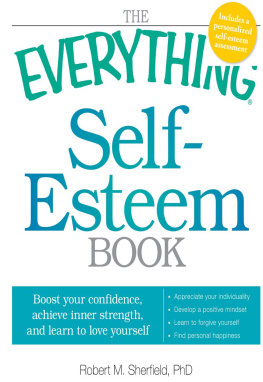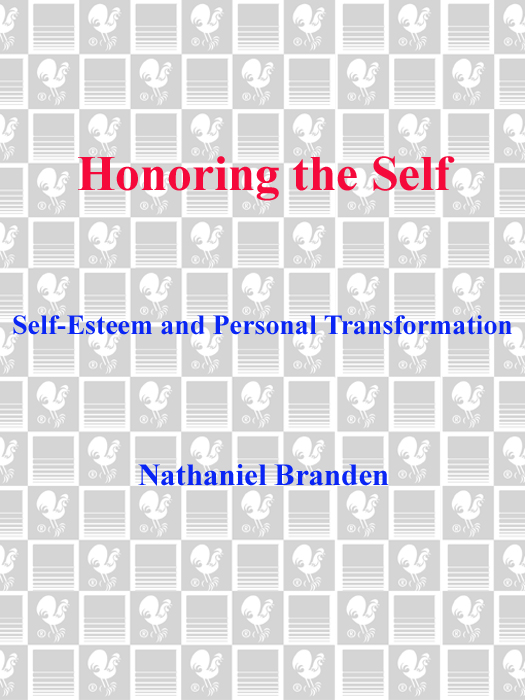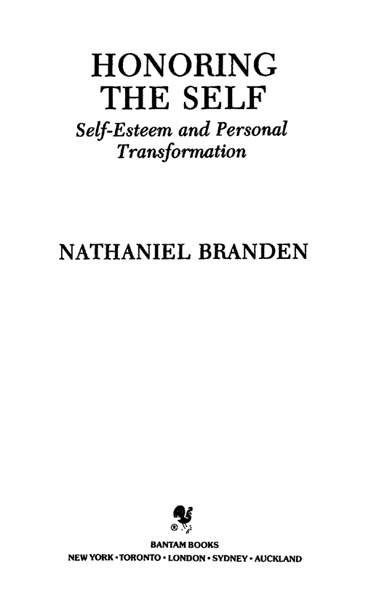AN ESSENTIAL MESSAGE FOR OUR TIME
Profound and practical, comments world-renowned family therapist VIRGINIA SATIR.
Nathaniel Branden has the courage to make us look at truths about self-esteem, ego, pride and heroism that we have tended to disown in recent decades. This provocative book has an important message for our time. GEORGE LEONARD, author of The Transformation and Education and Ecstasy.
A very important book with a very important message. KEN WILBER, author of Up from Eden.
Reading it was like sitting down to a banquetful of ideasa feast of soul-satisfying thoughts that fed our lives on many levels, both personally and professionally. ADELE FABER and ELAINE MAZLISH, authors of Liberated Parents, Liberated Children.
Much wisdom and clinical insight. BOOKLIST
Many worthwhile lessons here. PUBLISHERS WEEKLY
Branden embodies the courage essential to self-esteem. MARILYN FERGUSON, author of The Aquarian Conspiracy.
A highly innovative theorist in the field of self-esteem and personal transformation, Nathaniel Branden is Executive Director of The Branden Institute for Self-Esteem, a counseling center in Los Angeles, California. His bestselling books, The Psychology of Self-Esteem and The Psychology of Romantic Love were trailblazers that have acquired the status of classics. Now he goes beyond them in his new, climactic work, HONORING THE SELF.
Bantam Books by Nathaniel Branden
Ask your bookseller for the books you have missed.
HONORING THE SELF
HOW TO RAISE YOUR SELF-ESTEEM
THE PSYCHOLOGY OF SELF-ESTEEM
THE SIX PILLARS OF SELF-ESTEEM
This edition contains the complete text of theoriginal hardcover edition.
NOT ONE WORD HAS BEEN OMITTED.
HONORING THE SELF: SELF-ESTEEM AND PERSONAL TRANSFORMATION
A Bantam Book / published by arrangement with J. P. Tarcher, Inc.
PUBLISHING HISTORY
J. P. Tarcher edition published March 1983
Bantam edition / September 1985
All rights reserved
Copyright1983 by Nathaniel Branden.
No part of this book may be reproduced or transmitted in any form or by any means, electronic or mechanical, including photocopying, recording, or by any information storage and retrieval system, without permission in writing from the publisher.
For information address: Jeremy P. Tarcher, Inc. 9110 Sunset Blvd., Los Angeles, CA 90069.
eISBN: 978-0-307-79040-8
Bantam Books are published by Bantam Books, a division of Random House, Inc. Its trademark, consisting of the words Bantam Books and the portrayal of a rooster, is Registered in U.S. Patent and Trademark Office and in other countries. Marca Registrada. Random House, Inc., New York, New York.
v3.1
To Devers Branden
Contents
Acknowledgments
M y thanks to my publisher, Jeremy Tarcher, for his enthusiasm for this project since its inception, as well as for our discussions concerning the personal meaning, to him, of honoring the self, which always sent me back to my desk inspired.
My appreciation and deeply felt regard for the skill of my superb editor, Janice Gallagher, whose suggestions, feedback, and ruthless willingness to drive me past exasperation, always in the best interests of the book, contributed so much to the ultimate outcome.
My thanks to Ken Wilber for our illuminating discussions concerning the perspective of transpersonal psychology.
And finally, my deepest gratitude to my wife, Devers, to whom this book is dedicatedbecause of her unfailing emotional support during the writing, because of the many valuable psychological and literary suggestions she offered, and most of all because she embodies that attitude toward life I have loved, admired, and wanted to celebrate in my work, as long as I can remember.
Introduction
O f all the judgments that we pass in life, none is as important as the one we pass on ourselves, for that judgment touches the very center of our existence.
We stand in the midst of an almost infinite network of relationships: to other people, to things, to the universe. And yet, at three oclock in the morning, when we are alone with ourselves, we are aware that the most intimate and powerful of all relationships and the one we can never escape is the relationship to ourselves. No significant aspect of our thinking, motivation, feelings, or behavior is unaffected by our self-evaluation. We are organisms who are not only conscious but self-conscious. That is our glory and, at times, our burden.
We monitor, assess, and question ourselves in a way possible to no other species. We ask, Who am I? What do I want? Where am I going? What is my purpose in life?
Is my behavior appropriate to this purpose? Am I proud or ashamed of my choices and actions? Am I happy or unhappy to be who I am?
We have the ability to ask such questions, and we have the ability to run from them. But the questions are always there, waiting for our response, even if we choose to pretend they do not exist or do not concern us. They are there when we come home after a day of frenetic activity at work, when we come home from a party, the arms of a lover, a political rally, a charitable function, a religious encounter.
This book will be concerned, then, with the ultimate human encounter: the relationship of the I to the me, of the ego to the self. The issues entailed by this encounter reach into and affect virtually every significant human experiencefrom the level of our self-esteem, to the kind of person we are likely to fall in love with, to the ambitions and life goals we are likely to set ourselves, to our most intimately personal sense of what it means to be a human being.
At each step of the way, we shall confront some form of the question, Shall I honor or shall I betray the self? Not that we necessarily identify the issue in these terms; in fact, we rarely do, often preferring not to know the nature of the choice we are making. But in the natural course of our development, we inevitably face a variety of questions that bear on the same ultimate alternatives: Do I belong to myself or to others? Is the primary purpose of my self the pursuit of my own happiness and the fulfillment of my own positive potentialities, or is it compliance with the wants and expectations of others? Do I live by my own vision of things or by the vision of others? Is my basic concern with my own approval or with the approval of others? Am I to rely chiefly on my own mind or on the minds of my parents or teachers, leaders or guru?
Such questions are not only psychological, they are also philosophical and, more specifically, ethical. Psychology and ethics are intimately interrelated fields, although neither psychologists nor moralists have always been eager to acknowledge the connection. This book is written at the interface of the two disciplines.
How we relate to our selves affects how we relate to others, to the world around us, to the visible and invisible universe that constitutes our ultimate contextjust as how we relate to others and to the world affects how we relate to our selves. But we begin with the self and we shall conclude with the self, and why this is so should be clear by the time we arrive at the end of our road.


